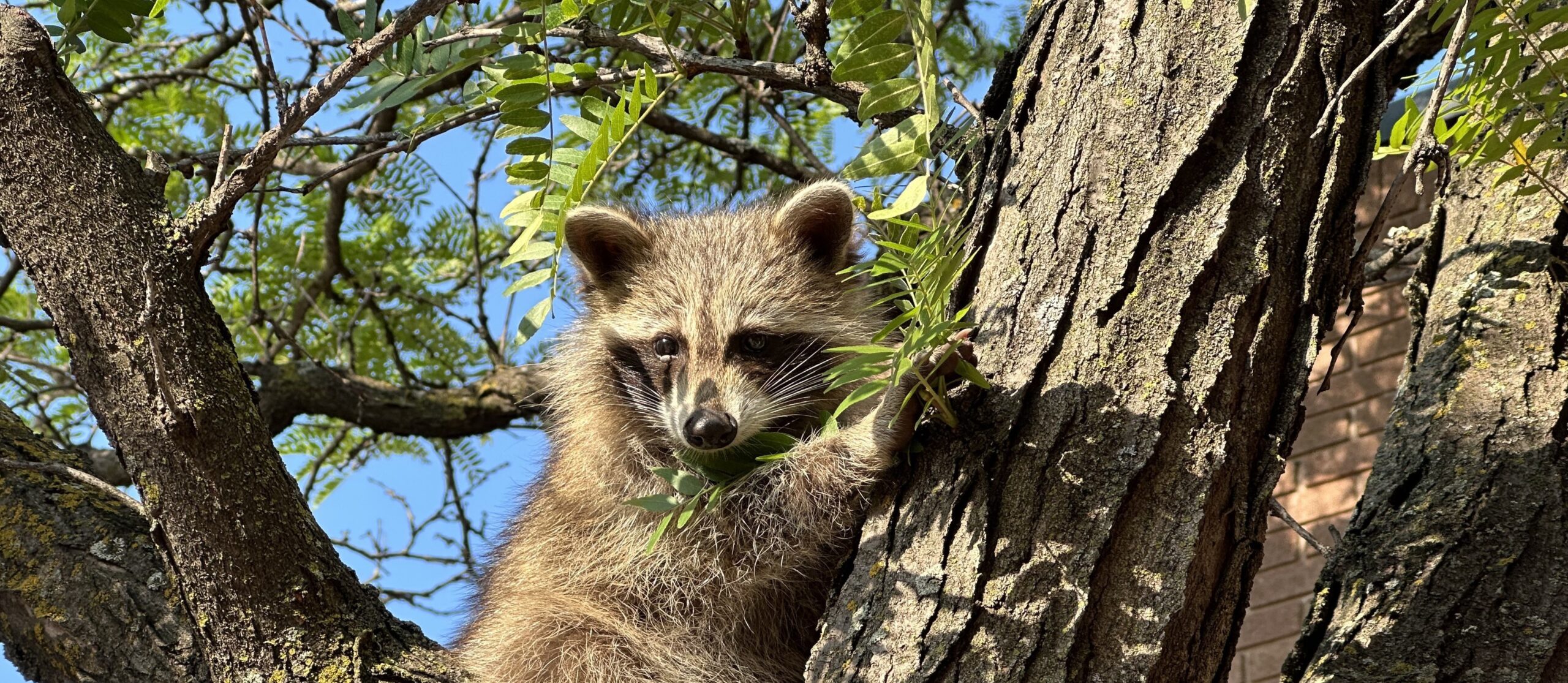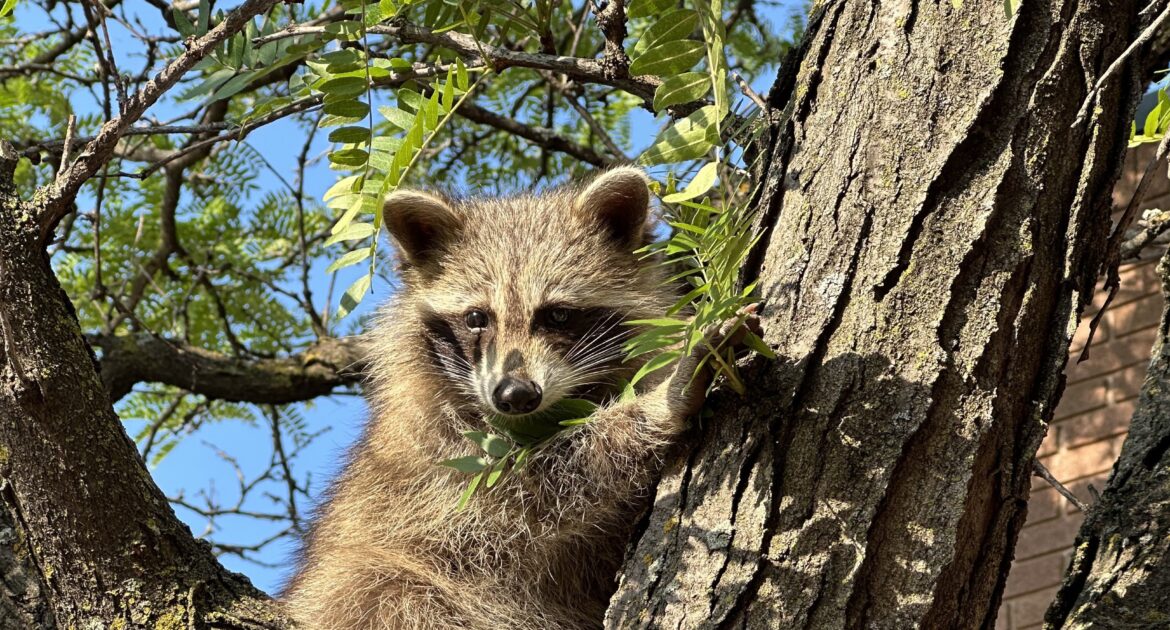Homeowners in Minneapolis may notice some unusual activity around their homes as the seasons change. From rustling noises in the attic during spring to overturned trash bins in late fall, seasonal raccoon activity patterns can lead to a variety of surprises. Understanding raccoon behavior by season is key to preventing unwelcome visits and protecting your property. These adaptable animals adjust their habits to align with seasonal challenges and opportunities, such as food availability and breeding cycles.
By understanding how seasons affect raccoons, you can stay one step ahead and keep your home secure—whether near Chain of Lakes or nestled closer to the downtown area.
Raccoon Behavior by Season
Raccoons experience significant behavioral changes with each season. Their activities are shaped by food availability, temperature changes, and reproductive needs. Here in Minneapolis, our frigid winters coupled with abundant spring flora make these patterns particularly noticeable.
Spring Activities
Spring marks the beginning of a busy season for raccoons. This is their primary breeding period, which begins in late winter. Female raccoons give birth between February and June, typically sheltering in warm, dry places like attics, chimneys, and garages. These spaces provide the ideal environment for raising litters of two to six offspring.
During this time, raccoons are particularly active as mothers forage for food to sustain themselves and their nursing kits. They rely heavily on protein-rich resources such as insects or small animals, but they won’t hesitate to raid your trash bins for easy pickings. Signs of spring raccoon activity include:
- Repeated loud noises in attics or walls during the night.
- Discarded food debris near potential entry points.
- Visible tracks or scratch marks on your siding.
Homeowners need to stay vigilant during spring. Sealing entry points and securing garbage bins can help reduce the likelihood of raccoon visits and prevent damage.
Summer Adjustments
Once summer arrives, raccoons grow even more adventurous. With mild weather and ample food sources such as berries, fruits, and nuts, their hunting grounds expand. While spring is predominantly about protecting and raising the young, summer sees the beginning of some independence for juvenile raccoons. These juveniles, often following their mothers, start practicing essential survival skills.
During summer, raccoons:
- Venture further in search of food.
- Spend more time in gardens and yards scavenging for fruits, seeds, or vegetables.
- Look for water sources to stay hydrated and cool.
They’re also more visible as the days grow longer since they will occasionally forage earlier in the evening. If your property includes fruit trees or accessible water features, expect higher levels of activity this season.
Fall Preparations
Fall signals preparation for the colder months. Raccoons spend much of their time foraging, eating, and storing fat to survive winter. This period is critical for them as their food intake increases dramatically. They’ll consume a diverse diet ranging from fallen acorns to the leftovers in your trash.
Noteworthy fall activities include:
- Increased nighttime foraging.
- Seeking out potential dens to escape the impending cold.
- Testing structural vulnerabilities in search of warmth, such as loose roof tiles or rotted wood.
By fall, raccoons are at their most opportunistic, and homeowners should pay close attention to areas that could invite them indoors.
Winter Survival Strategies
During Minneapolis winters, raccoons don’t hibernate fully. Instead, they enter a state known as torpor, where their activity decreases but doesn’t entirely stop. While food is much scarcer during this cold season, they still emerge to scavenge on milder days. For this reason, raccoons prioritize finding warm dens, often in attics, under porches, or nestled between walls.
Signs of winter raccoon entry include:
- Scratching or scampering sounds during unseasonably warm nights.
- Disturbances in insulation or ductwork.
- Discovery of droppings in crawl spaces.
It’s crucial to winterize your home effectively to deter raccoons during this time. Reinforcing vent covers and inspecting your home’s exterior for potential entry points are practical measures to take.
Seasonal Raccoon Activity Patterns
Raccoons are creatures of habit, often following predictable seasonal cycles influenced by their surroundings. Recognizing these activity patterns can allow homeowners to time preventative measures properly.
Seasonal Variations in Behavior
Changes between seasons don’t just affect overall raccoon activity; they also impact their feeding habits and the types of shelter they seek. For example:
- Spring and summer focus heavily on family and nurturing young.
- Fall centers on food preparation for winter storage.
- Winter activity condenses into brief bursts of movement as raccoons conserve energy.
By understanding these patterns, you can anticipate how raccoons may interact with your property throughout the year.
Why Seasonal Adjustments Matter
Raccoons’ ability to adapt to environmental changes ensures their survival but also makes them a persistent concern for homeowners. Each phase of their yearly cycle brings unique challenges. For example, spring may signal the presence of baby raccoons, while fall often corresponds with property damage as they prepare for winter.
Addressing seasonal needs proactively helps create a safer environment for both you and the surrounding wildlife. It also minimizes disruptions and costly damages, as early intervention can prevent raccoons from setting up dens in difficult-to-reach areas.
How Seasons Affect Raccoons
Every season directly affects raccoons’ diets, denning behaviors, and territory management. These omnivorous animals will adapt their diets based on availability:
- Spring’s offerings include insects, small mammals, and young vegetation.
- Summer introduces fruits and garden crops.
- Fall provides seeds, nuts, and scavenged foods.
- Winter drastically limits their options, leading them to rely on human-provided scraps.
This adaptability explains why raccoons thrive in urban areas like Minneapolis, with its mix of residential neighborhoods, parks, and dumpsters offering year-round opportunities.
Their denning habits also evolve seasonally:
- Spring dens are carefully selected for warmth and safety.
- Summer dens allow for quick access to plentiful food.
- Fall dens are chosen for insulation against dropping temperatures.
- Winter dens typically last the entire season, often incorporating human-made structures for added protection.
Finally, their territories expand and contract seasonally depending on resource competition. While summer sees abundant movement, winter activity is often confined to well-chosen dens with limited foraging excursions.
Skedaddle’s Humane Raccoon Removal Services
At Skedaddle Humane Wildlife Control, we are dedicated to providing professional and reliable raccoon removal services that prioritize the safety and well-being of both homeowners and wildlife. Recognizing the challenges raccoons pose when they enter residential spaces, our team employs proven, industry-leading techniques to address infestations effectively and ethically.
- Thorough inspection of your property to identify entry points, nesting areas, and contributing factors.
- Humane removal strategy implemented by trained technicians to ensure raccoons are safely evicted without harm.
- Use of one-way door systems that allow raccoons to exit but prevent re-entry.
- Special care taken to identify and safely relocate dependent young, ensuring no animal is left behind or endangered.
Protect Your Home Year-Round
Seasonal changes heavily influence the behavior and habits of raccoons, making them both fascinating and challenging neighbors. From spring breeding to fall foraging, these adaptable animals can quickly shift their activities to take advantage of available resources. For homeowners near popular Minneapolis landmarks like Minnehaha Falls or the Mississippi River, knowing what to expect during each season and taking proactive measures is essential to maintaining a raccoon-free home.
If you’re dealing with raccoon’s seasonal visits or need help safeguarding your property, reach out to us at Skedaddle. Our team is ready to assist you with humane, effective solutions any time of year. Book your assessment today and ensure your property remains safe and secure.




